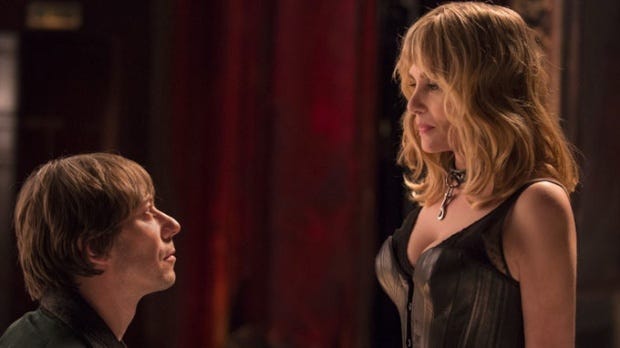Venus in Fur

The manipulation of municipal water. The demonic impregnation of an unknowing woman. A prime minister's obstruction of justice. Many of Roman Polanski's films revolve around dizzying acts of deception. His latest, "Venus in Fur," is one of his most intriguing tales of treachery.
Based on the play by David Ives, the film follows playwright-director Thomas Novocek (Mathieu Amalric) as he's auditioning actresses for his new production — an adaptation of Leopold von Sacher-Masoch’s 1870 novel, "Venus in Fur." The film opens with him alone in a Paris theater, storming like the weather outside and frustrated by the lack of actresses who have the erotic, commanding power of the lead character in the book by Sacher-Masoch, whose name was used to coin the term "sadomasochism."
Enter Vanda Jordan (Emmanuelle Seigner). Just like the other actresses Thomas auditioned, she is a silly mess — soaking wet, smacking gum, carrying a coffee-stained script. (Seigner arrives on screen with a brash, brilliant comic force.) After much whining from both of them, Thomas agrees to let her audition for the role of Wanda von Dunayev.
Vanda is so convincing as the elegant Wanda that she leaves Thomas — and us, the viewers — wondering whether her ditzy personality offstage is the real act. The film emerges into an enticing look at acting as seduction and the insidious allure of what is fictitious yet flesh and blood. Vanda exudes a palpable air of mystery, and the film envelops her actions in an ominous atmosphere, with thunder crashing outside the theater in which she auditions. With this menacing mood, Polanski, like Vanda, worries us that we are not simply being engaged by an audition, but rather that a dangerous act of con artistry is underway.
Among other talents, Polanski is a master of menace. It seeps through the dry soil of "Chinatown" and lingers in the clouds hovering above Martha's Vineyard in "The Ghost Writer." But the performances he draws from Seigner and Amalric emerge as the major draw of this film. Seigner casts a spell, seducing yet scaring us with her jarring transformation onstage. Amalric makes Thomas' fascination and fear our own.
Like the character for which she is auditioning, Vanda seduces Thomas, exerting dominance over him, taking power away from the director. (Theater, after all, is an actor's medium, the film reminds us.) The stage is claustrophobic, the tension between them is thick. They thrust themselves into a dazzling dance, a brilliant battle of wills.
At once unsettlingly and electrifyingly intimate, "Venus in Fur" is a thrilling piece of theater and cinema. Like a great play you spontaneously venture out at night to see, it initially seems a little awkward and strange, but it eventually pulls you to the edge of your seat, tantalizing with fictitious characters in the flesh. You watch their actions with admiration and a bit of apprehension, like you would as con artists or magicians sweep the rug out from under you. It's seductive. You will giddily surrender to that seduction during "Venus in Fur."
https://www.youtube.com/watch?v=Q1LZ6JoUkJc


